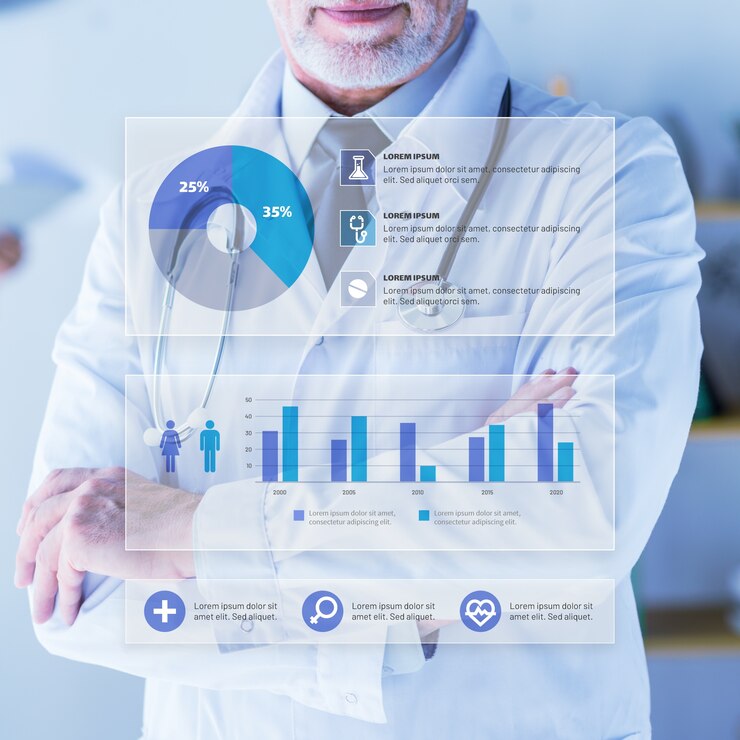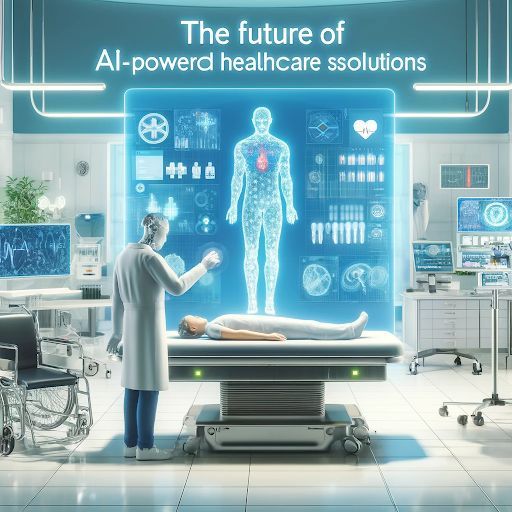Data science is the understanding of complex data using algorithms, statistics, and machine learning. A vast amount of healthcare data is provided daily via wearable technologies, medical imaging, patient records, and other sources. Using this data can significantly improve clinical decision-making and patient outcomes.

The application of data science could greatly improve patient outcomes. By gathering information on a patient, medical professionals can give them better care.
By analyzing historical data, predictive analytics assists medical practitioners in anticipating patients’ future needs. In addition to enabling individualized medicine, data science can help optimize healthcare operations procedures, resource allocation, and expenses.
Data Science Applications in Healthcare
Data science services are applicable across the healthcare industry. However, there are a few areas where data science has had a big influence.
1. Wearable Technology
Wearable medical equipment has become increasingly popular in recent years. In their daily lives, patients depend more on wearable technology to measure their fitness and fertility to forecast their chances of getting sick. Additionally, physicians are increasingly relying on these technologies to obtain real-time health data so they may continuously monitor the patient’s condition.
Timely interventions allow the identification of early indicators of health problems using this data. By monitoring heart rate and identifying abnormalities, wearable technology can notify medical professionals of any issues before they worsen.
2. Predictive Analytics in Patient Care
Early disease detection has a substantial impact on patient outcomes. Predictive analytics is a useful tool in this endeavor. Predictive algorithms can examine patient data to forecast the chance of developing chronic illnesses like diabetes or heart disease. This proactive strategy enables physicians to provide early intervention and therapy.
3. Diagnostics and imaging in medicine
Machine learning has revolutionized medical imaging and diagnostics. Many healthcare institutions are now turning to healthcare AI consulting to implement these advanced technologies effectively. Algorithms can accurately identify irregularities in medical images, like MRIs and X-rays. This technology helps patients by increasing accuracy and speeding up the testing process. Check out the Biomedical Image Analysis in Python course to learn more about these techniques.
4. Precision Medicine and Genomics
Precision medicine is being made possible by data science’s advancement of genome research. Researchers can use genetic data analysis to identify genetic markers associated with diseases. Consequently, more precise diagnoses and focused therapies may result. There is a growing trend of customized treatment regimens based on lifestyle and genetic information.
5. EHR
Modern healthcare relies heavily on Electronic Health Records (EHR). Advanced EHR software enhances how this information is managed and analyzed, leading to better patient care and more efficient operations. By evaluating EHR data, healthcare professionals can identify trends, monitor outcomes, and make informed, data-driven decisions that improve both clinical and administrative processes.
Benefits of Data Science in Healthcare
Physicians, patients, and healthcare organizations all gain from the use of data science in healthcare, which enhances public health. DHospital diagnostic capacities may be enhanced, epidemics and outbreaks can be identified early, and novel drugs can be discovered with the help of data scientists.
1. Aids in the Development of Drugs
Drug research and development require significant time and financial investments, but these initiatives usually fall short. However, a healthcare data scientist might use existing historical data and studies to speed up the research. Machine learning approaches enable the prediction of drug performance and adverse effects.
2. Removes Human Errors
Errors will inevitably occur in any procedure that involves manual work. Errors are inevitable when people are exhausted, overburdened, preoccupied, and burned out. Even a minor mistake can have serious repercussions in a medical setting. By using automation solutions to complete normal and repetitive tasks, workers may concentrate on their main responsibilities and make fewer mistakes.
3. Provides Personalized Care
By evaluating enormous volumes of patient data, such as genetic information, lifestyle choices, and medical histories, data science in the medical industry makes it possible to customize treatments to meet the needs of each patient.
A digital health data scientist gives healthcare professionals useful information for improved patient outcomes by using informatics and machine learning algorithms to identify trends and forecast treatment outcomes. For instance, by examining tumor markers and genetic alterations, doctors can use their understanding of health data science to choose the best cancer treatment.
Challenges to be Considered in Healthcare
Effective utilization of data improves patient treatment plans and clinical outcomes. By employing data analysis to inform their choices, healthcare providers can enhance patient care. Studies have indicated that the utilization of data analytics can lead to significant improvements in healthcare outcomes.
There are advantages of applying data science to the healthcare industry. However, there are still problems that need solid fixes. Below, let’s examine a few.
1. Integrating with current systems
The integration of new data technologies with legacy systems is a barrier for businesses switching to new data systems. Ensuring seamless integration and data interoperability might be difficult to accomplish. System integration can be made easier by using strategies like standardizing data formats and utilizing middleware to fill in gaps between various systems.
2. Security and Data Privacy
Maintaining the security of that system is more crucial than ever as the healthcare sector depends increasingly on data. Hospitals have seen ransomware attacks in recent years, which have caused operational disruptions and postponed patient care. Furthermore, safeguarding patient information is crucial. To protect patient information, healthcare firms must ensure that laws like HIPAA are followed. Regular security audits, access limits, and encryption are methods for protecting the privacy and security of data.
3. Data Quality & Governance
For data science to be effective, maintaining high-quality data is essential. Regretfully, healthcare data is frequently dispersed between systems with disparate internal standards. Furthermore, data is frequently not updated promptly, which leads to inconsistent and out-of-date source data.
Data governance frameworks help ensure that data is accurate, consistent, and complete. By concentrating on a solid data governance policy, healthcare organizations can ensure they have accurate, consistent data to feed into their analytics.
Future of Data Science in Healthcare
The future of data science and healthcare is bright. The various tools and methods discussed in this article have the potential to advance medical research, increase patient satisfaction, and bring about constructive, long-term change. Wearables, imaging, genomics, and other applications can help make the system more useful, affordable, and accessible. Through the use of genomic research and early diagnosis, physicians can begin treating patients before the disease worsens.
Medical data science can be used in post-release care to provide individuals with control over their health. In addition, physicians are no longer concerned with patient follow-up or reminders. Users can receive notifications about new appointments and medications via remote monitoring tools. Patients and doctors can utilize these data science solutions and assign them part of their jobs.
Despite the obvious advantages of data science software, it might be difficult to win over all the stakeholders. Communicating how this technology might enhance and optimize their lives is essential. You can only expect full participation from all stakeholders if you take the effort to explain how medical staff can benefit from data science applications.
Read More:
how does an emergency action plan benefit your workplace?
why are mobile devices critical to a digital forensics investigation?
what level of system and network configuration is required for cui
what are some long-term consequences of not learning to save while you’re young?

Founder Dinis Guarda
IntelligentHQ Your New Business Network.
IntelligentHQ is a Business network and an expert source for finance, capital markets and intelligence for thousands of global business professionals, startups, and companies.
We exist at the point of intersection between technology, social media, finance and innovation.
IntelligentHQ leverages innovation and scale of social digital technology, analytics, news, and distribution to create an unparalleled, full digital medium and social business networks spectrum.
IntelligentHQ is working hard, to become a trusted, and indispensable source of business news and analytics, within financial services and its associated supply chains and ecosystems











